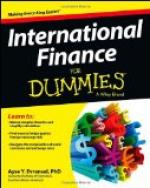If there is failure, partial or complete, then the task of holding the baby is longer and more uncomfortable, the more puny and unattractive it is. If, owing to some accident in the monetary atmosphere, a Colonial loan does not go off well, the underwriters who find themselves saddled with it, can easily borrow on it, in normal times, and know that sooner or later trustees and other real investors will take it off their hands. But if it is an issue of some minor European power, or of some not too opulent South American State, that is coldly received by the investing public, bankers will want a big margin before they accept it as security for an advance, and it may take years to find a home for it in the strong boxes of real investors, and then perhaps only at a price that will leave the underwriters, like Sir Andrew Aguecheek, “a foul way out.” There is thus a logical reason for the higher profits attached to the more questionable issues, and this reason is found in the greater risk attached, if failure should ensue.
Thus we arrive at the reply to those who criticize International Finance on the ground that it puts too big profits into the pockets of those who handle it. If the profits are big, it is only in the case of loan issues which carry with them a considerable risk to the reputation of the fathering firm, and to the pockets of the underwriters, and involve a responsibility, and in the case of default, an amount of wholly unpaid work and anxiety for which the big profits made on the opening proceedings do not nearly compensate. As in the case of the big gains made by patent pill merchants, and bad novelists, it is the public, which is so fond of grumbling because other people make fortunes out of it, that is really responsible for their doing so, by reason of its own greed and stupidity. Because it will not take the trouble to find out how to spend or invest its money, it asks those who are clever enough to batten on its foibles, to sell it bad stuff and bad securities, and then feels hurt because it has a pain in its inside, or a worthless bond at its banker’s, while the producers thereof are founding county families. If the public would learn the A B C of investment, and also learn that there is an essential difference between investment and speculation, that they will not blend easily but are likely to spoil one another if one tries to mix them, then the whole business of loan issuing and company promotion would be on a sounder basis, with less risk to those who handle it, and less temptation to them to try for big profits out of bad ventures. But as long as
“the fool multitude that choose by show”
give more attention to the size of an advertisement than to the merits of the security that it offers, the profits of those who cater for its weaknesses will wax fat.




